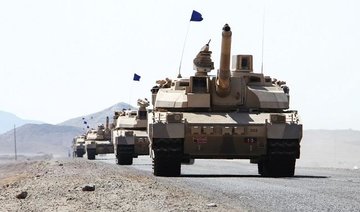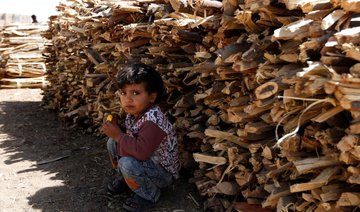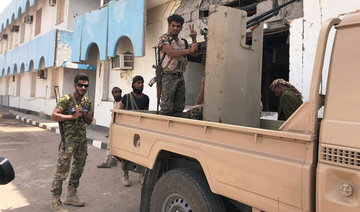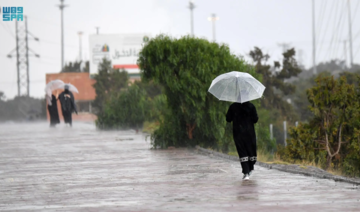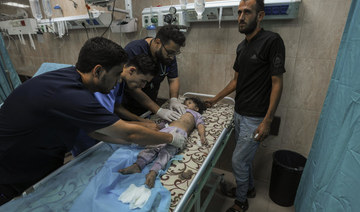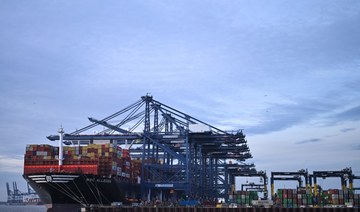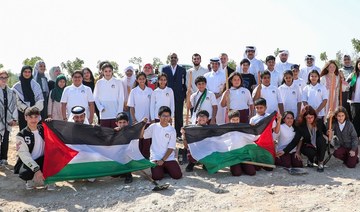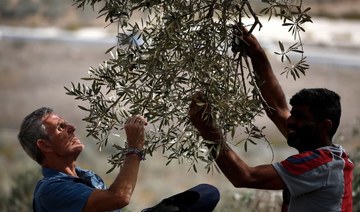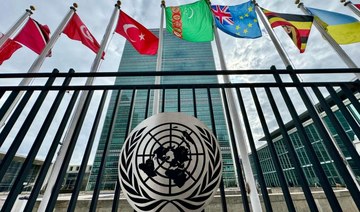AL-MOKHA: It took Seham Ali Ibrahim one month to make the dangerous journey from her village near the frontline town of Al-Heiss to the relative safety of Yemen’s western coast areas, often traveling by foot across battle lines.
Now, she lives in a straw hut with three other families, including nine children, outside Al-Mokha where many displaced Yemenis have built makeshift shelters and rely on aid provided by humanitarian organizations and coalition forces.
“We walked ... We rode donkeys and cars ... We made it to Al-Mokha in a month,” said the elderly Ibrahim, who does not know her exact age.
Yemen has been devastated by three years of conflict in which President Abed Rabbo Mansour Hadi’s government, backed by the Arab coalition, is fighting to drive the Houthi militia out of cities they seized in a series of operations since 2014.
Al-Mokha, located some 75 km north of the strategic Bab Al-Mandab strait, and neighboring Al-Khoukha and Al-Heiss are among the few towns conceded by Houthi militias since Yemen’s civil war started in 2015.
“At least 40,000 have been displaced in recent weeks,” Yemen’s Deputy Health Minister Eshrak Al-Soubai told Reuters.
“Most displaced people are coming from the areas of fighting in Al-Heiss district (some 90 km away) ... the situation is very critical,” she said during a visit to Al-Mokha hospital, the only medical facility in the coalition-controlled western coast.
Last month, the UN said at least 85,000 Yemenis had left their homes in the area since fresh fighting erupted in December 2017.
Doctors and medical staff at Al-Mokha hospital are struggling on a daily basis to provide aid and treatment for victims of the war and diseases.
Across Yemen, millions of civilians are facing a crackdown by the Houthi militia. Famine, cholera and diphtheria affect about 8 million people, including 2 million severely malnourished children.
Haynam Salem, 40, lay in pain on an old examination table in a dusty room in the civilian wing of Al-Mokha hospital after losing her five-month-old fetus shortly upon arriving in the town with her children from Al-Hameli village in Taiz province.
Plastic water bottles are being used as serum injection bags in the facility hit by shortages of medical supplies.
“The procedure to take the dead fetus out of her womb is not very complicated, but I am waiting to get some blood and I need at least two pounds,” said Abderrahim Al-Dhabi, a doctor working with the World Health Organization and the Arab coalition. “Hopefully, tomorrow I will get some.”
Nurses said the hospital lacks basic primary care, including a maternity doctor, and that they had not been paid for five months.
“We asked the coalition for help, we asked international organizations but nobody seems to care,” said Maymouna Ali Ahmed, chief nurse in charge of maternity care at the facility.
Outside the hospital, sandstorms swept the main unpaved street of the town, with thousands of used plastic bags covering the bushes and other desert vegetation.
The local power plant has started to run again but is producing only five megawatts (MW), far below its capacity of 160 MW produced before the war.
Displaced Yemenis are not the only ones relying on aid. Workers at the power plant said the managing director of the plant paid them in cash on a monthly basis, but that for the last year their pay had been slashed to 24,000 Yemeni riyals (around $40) down from 60,000 riyals.
In a Yemeni town, hardship awaits displaced civilians
In a Yemeni town, hardship awaits displaced civilians
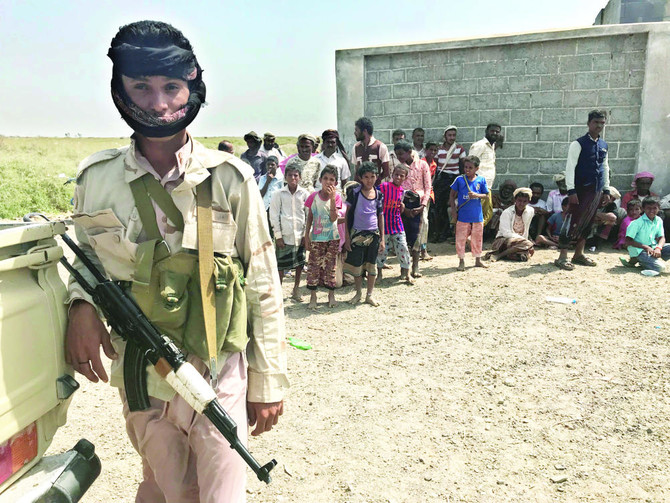
Suspected Houthi missiles hit commercial ship in Red Sea
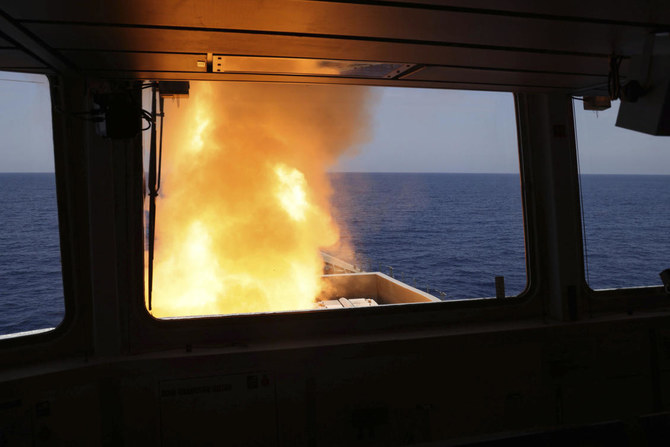
- US military destroys new barrage of militia drones
- CENTCOM says actions taken to protect freedom of navigation and make international waters safer
AL-MUKALLA: Missiles thought to have been fired by Houthi forces in Yemen targeted a commercial ship in the Red Sea on Monday as the US military destroyed a new barrage of Houthi drones.
UK Maritime Trade Operations said that it received an alarm about an explosion in the proximity of a commercial ship 87 km northwest of Yemen’s western town of Al-Mokha, but that the ship and the crew were safe.
“Vessels are advised to transit with caution and report any suspicious activity to (us),” UKMTO said on X.
Ambrey, a UK maritime security service, identified the target ship as a Malta-flagged cargo vessel that was hit by three missiles while travelling from Djibouti to the Gulf.
The Houthis did not immediately claim responsibility for Monday’s strike, although they often only take credit several hours, sometimes even days, after an attack.
Since November, the Iran-backed Houthis have seized one commercial ship, sunk another, and launched hundreds of drones, ballistic missiles, and remotely operated and explosives-laden boats at commercial and navy vessels in the Gulf of Aden, the Red Sea, and the Bab Al-Mandab Strait.
The Yemeni militia claims that the assaults are aimed only against Israel-bound and Israel-linked ships to push Israel to allow humanitarian supplies into the Gaza Strip.
In response to the Houthi’s ship campaign, the US formed a coalition of marine forces to protect critical maritime channels off Yemen and began strikes on Houthi-controlled areas of Yemen.
The US Central Command said that its forces on Sunday intercepted five drones launched by the Houthis over the Red Sea that were aimed at the US, its allies, and international commercial and naval ships.
“These actions are taken to protect freedom of navigation and make international waters safer and more secure for US coalition and merchant vessels,” CENTCOM said on X on Monday morning.
At the same time, the Houthi-run Saba news agency reported that the group’s armed forces carried out more than 83 strikes on 103 ships affiliated with Israel and its allies, as well as shooting down three US military MQ-9 Reaper drones between November 19, 2023, and April 26, 2024.
In a 39-page report on campaign against shipping in the Red Sea, the Houthis claimed that their strikes killed two American marines, two Filipinos, and one Vietnamese sailor while injuring four marines from the US-led marine task force.
During the campaign, the Houthis captured one ship, set fire to four, sunk two others, and damaged scores more, according to the report.
Despite a recent escalation in the number of strikes, since late last month the Houthis have drastically curtailed missile and drone attacks on ships.
The decrease in assaults has caused US military generals and analysts to surmise that the Houthis may have run out of weaponry and that the US-led air campaign reduced their military capabilities.
Jordan welcomes UK delegation to introduce weather forecasting project
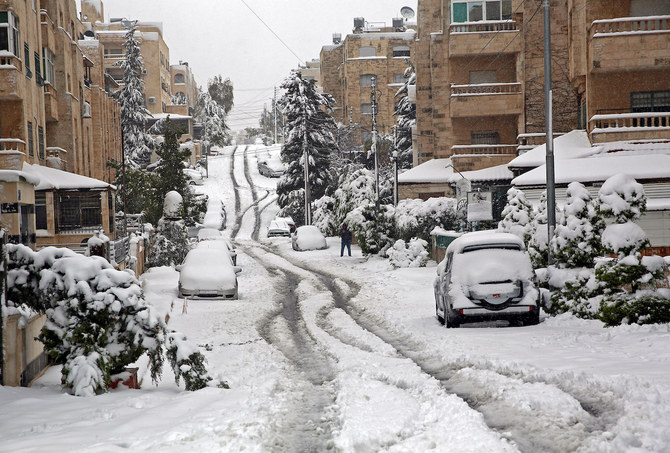
- Project aims to provide meteorological data and early warnings to refugee-hosting communities
AMMAN: Jordanian Transport Minister Wesam Altahtamouni welcomed a delegation from the British Embassy in Amman and the British Meteorological Office on Monday.
The meeting came as part of the UK Foreign Ministry’s efforts to implement the Jahez project, which aims to provide meteorological data and early warnings to refugee-hosting communities, Jordan News Agency reported.
Jahez, which will span three to five years, aims to develop proactive plans and long-term strategies, enhance monitoring and forecasting systems, and implement resilience-building measures to mitigate the effects of climate change.
The collaboration will involve Jordan’s ministries of transport, environment, planning, water and irrigation, as well as relevant municipalities.
Helen Ticehurst from the British Meteorological Office explained the British Meteorological Office’s operations and the objectives of Jahez.
The project also focuses on climate finance for countries hosting refugees.
Altahtamouni praised the British delegation for its willingness to provide technical assistance, leveraging the expertise of the British Meteorological Office in proactive weather forecasting and climate change adaptation.
Djibouti FM to stand at African Union Commission elections
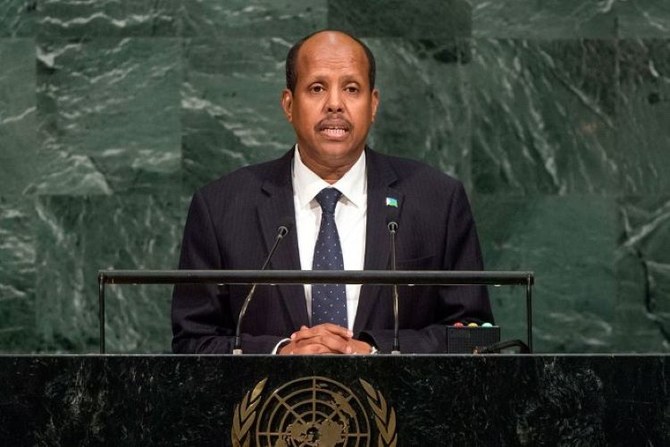
- Mahamoud Ali Youssouf calls for resolution of conflicts in Sudan, Gulf of Aden and Gaza
- Mahamoud Ali Youssouf: The only thing we know for sure today is that the next president will come from an East African country
RIYADH: Mahamoud Ali Youssouf, the minister of foreign affairs and international cooperation of the Republic of Djibouti, intends to stand for election to the African Union Commission.
The commission is based in Addis Ababa, Ethiopia. Its main functions are to represent the AU and defend its interests under the authority and mandate of the assembly and executive council.
The minister said that the main objectives of the commission are to promote integration, economic and social development, peace, security and human rights on the continent. It also aims to strengthen continental and international cooperation.
Tradition dictates that the president of the commission should be elected for a renewable four-year term, and should obviously be African, especially as the next session will be chaired by the East African Community, which includes Djibouti among its members.
The diplomat believes that winning these elections will contribute greatly to strengthening integration between the countries of the continent, as well as to reinforcing African relations with various other geographical groups, given the international and regional acceptance and respect enjoyed by Djibouti thanks to its balanced foreign policy.
Youssouf said he had been encouraged to stand as a candidate in the forthcoming elections by the respect and diplomatic appreciation that Djibouti possesses, highlighting also his long personal experience in the diplomatic field as an ambassador and then as minister of foreign affairs and international cooperation since 2005, and his in-depth knowledge of the work of the AU.
He said that a good knowledge of continental affairs is essential to occupy such an important position, adding that such an organization needs experienced leaders and diplomats to effectively promote continental and international cooperation given the continent’s current circumstances.
“The only thing we know for sure today is that the next president will come from an East African country. It will then be up to the member states to decide on the day of the vote,” he said.
Youssouf said that if elected, he will focus, in the interests of the African people, on three important areas: strengthening cooperation and economic integration between the countries of the continent; developing continental and international cooperation; and cooperation with international and regional organizations such as the UN, the Organization of Islamic Cooperation and the Arab League.
In early January, the Somaliland region signed an agreement with Ethiopia granting it a maritime opening to the Gulf of Aden. This treaty led to a political crisis between Ethiopia and neighboring Somalia, which promptly cancelled the memorandum, calling it illegal.
Youssouf said Djibouti currently chairs the Intergovernmental Authority on Development, and that Somalia and Ethiopia are members, along with other countries in the region, which gives it an additional responsibility in mediating between the two. He said that settlement efforts are continuing with Djibouti and Kenya mediating, with hopes that the two parties will reach an agreement soon.
He added that Djibouti, through its current presidency of IGAD, is very interested in seeing diplomatic relations between Somalia and Ethiopia return to what they were before the signing of the MoU.
Youssouf maintains that other crises in the world have distracted attention from Africa’s bloodiest conflict in Sudan, calling it the most forgotten crisis, especially when it comes to refugees and population displacement. He said that over 6.5 million Sudanese have been forced to leave their homes, with over a third of them displaced outside the country, and that the proliferation of ethnically-based militias in the current conflict is equally alarming.
As Sudan is a founding member of IGAD, he said Djibouti is making intense and continuous efforts in coordination with the other member states and the international community, notably the US and Saudi Arabia, to find a solution to the ongoing conflict in this brotherly country.
He also revealed that his country had already received representatives of the parties responsible for the crisis in Sudan to listen to their points of view and their vision for a solution. It should be noted that all have affirmed their desire to put an end to the war, and hope that these efforts will lead to a permanent and unconditional ceasefire, Youssouf said.
Recently, attacks on ships in the Red Sea have intensified, targeting vessels and disrupting this most important maritime passage. Youssouf said Djibouti is following these developments with great concern, specifying that the Bab Al-Mandeb Strait, overlooked by Djibouti, is considered an international passage of extreme importance from a political and economic point of view.
He confirmed that any breach of security in this area has global repercussions, given its role as a vital artery for international trade, and called for solutions to be found to the various crises in the region, so that everyone can enjoy peace and security.
With regard to the war on Gaza, Youssouf urged the international community to assume its responsibilities and put an end to the Israeli campaign which has cost the lives of over 34,000 people, as well as the resulting displacement and famine threatening the lives of millions of children.
Jordan nominates ancient Mehras olive trees for UNESCO Intangible Cultural Heritage list
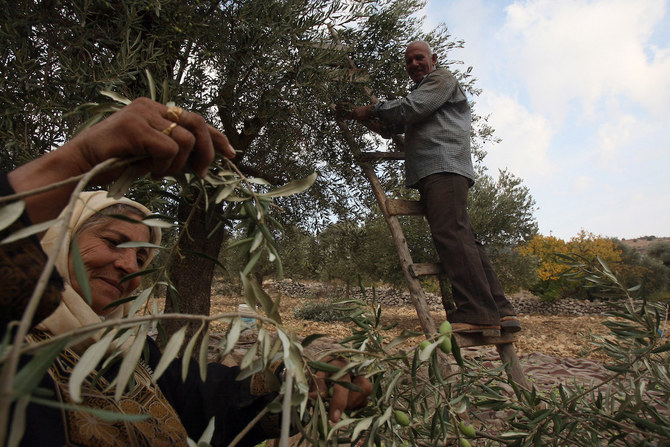
- Culture minister underscored the profound importance of the olive tree in Jordanian society
AMMAN: Jordan has nominated its Mehras olive trees for inclusion on UNESCO’s representative list of Intangible Cultural Heritage for the year 2025, Jordan News Agency reported on Monday.
According to the Food and Agricultural Organization, Jordan has some of the world’s most ancient habitats for olive trees.
Olive trees cover approximately 30 percent of all cultivated land in Jordan, constituting 75 percent of fruit trees. The olive trees hold immense significance for Jordan’s economy, environment, and culture.
Jordanian Culture Minister Haifa Najjar highlighted the importance of the tree to Jordanian heritage, drawing attention to its regional and international significance.
The minister underscored the profound importance of the olive tree in Jordanian society, representing both agricultural prowess and the cultural heritage deeply ingrained in the lives of its people.
She commended the collaborative efforts between the Ministry of Culture and national stakeholders in finalizing the nomination dossier for “The Ancient Olive Tree — Al-Mehras” to be presented to UNESCO in Paris.
Najjar noted the ministry’s commitment to documenting and safeguarding elements of intangible cultural heritage and the positive effect of such nominations on Jordan’s cultural presence globally.
The ministry previously secured UNESCO recognition for Jordanian cultural elements such as As-Samer traditional dance and mansaf, a traditional dish.
The ministry has participated in joint Arab nominations to UNESCO, highlighting the interconnectedness of cultural practices across the region. Previous submissions included files on date palm cultivation and Arabic calligraphy.
Looking ahead, Najjar mentioned joint Arab nominations currently under consideration for the 2025 UNESCO list. These encompass an array of practices and traditions, including mud architecture, traditional attire for men, musical instruments such as the oud, and various crafts and skills associated with Arab cultural heritage.
Dubai launches major AI economic strategy
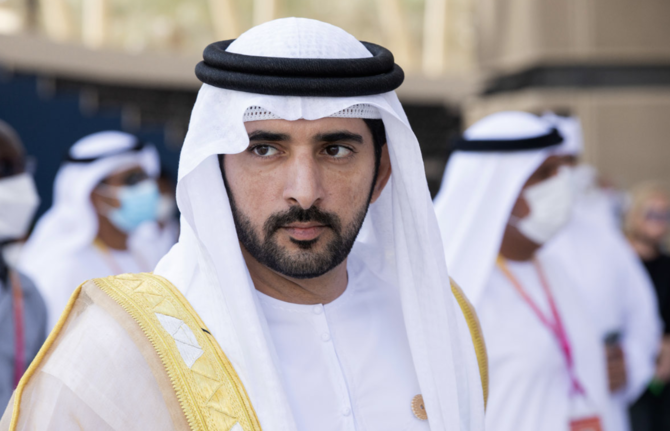
- Crown prince said initial phase of plan, by leveraging AI, would enhance quality of life and well-being for Dubai residents
RIYADH: Dubai’s crown prince on Monday launched a major artificial intelligence drive across government, business and education in the emirate.
The Dubai Universal Blueprint for Artificial Intelligence aims to achieve the Dubai Economic Agenda D33 — to double the size of the economy by 2033 — by adding AED100 billion ($27 billion) from digital transformation and increasing economic productivity by 50 percent.
The strategy includes appointing chief Al officers in government entities, the launch of a Dubai AI and Web3 campus, the launch of AI weeks at the emirate’s schools, a plan to attract data centers and the launch of a trade license for AI.
Sheikh Hamdan bin Mohammed Al-Maktoum said that the initial phase of the plan, by leveraging AI, would enhance quality of life and well-being for Dubai residents.
“Dedicated incubators and campuses for artificial intelligence will be launched to further enhance Dubai’s vibrant AI ecosystem, and finally AI will be celebrated in Dubai schools with the introduction of an AI week,” he said on X.
“We will annually review, update and introduce new projects under this plan, ensuring it keeps pace with all developments. Dubai is a city centered around its people, and to this end, we will dedicate all our resources and energy to make it the happiest place in the world.”
The crown prince said: “In 1999, his highness Sheikh Mohammed bin Rashid Al-Maktoum initiated the pioneering journey of the future by launching Dubai’s digital transformation, a venture that has continued to achieve milestones, leading to the recent unveiling of the Dubai Digital Strategy last year.
“We have realized record-breaking accomplishments that have established us as the premier hub for billion-dollar global enterprises in the technology and artificial intelligence sectors within the region,” he added.
Sheikh Hamdan said that the evolution of AI is presenting opportunities for nations and governments, but posing challenges to those unable to keep pace.
For Dubai, this requires a “swift and adaptive action plan,” responding to the “rapid changes in technology and AI,” he added.


